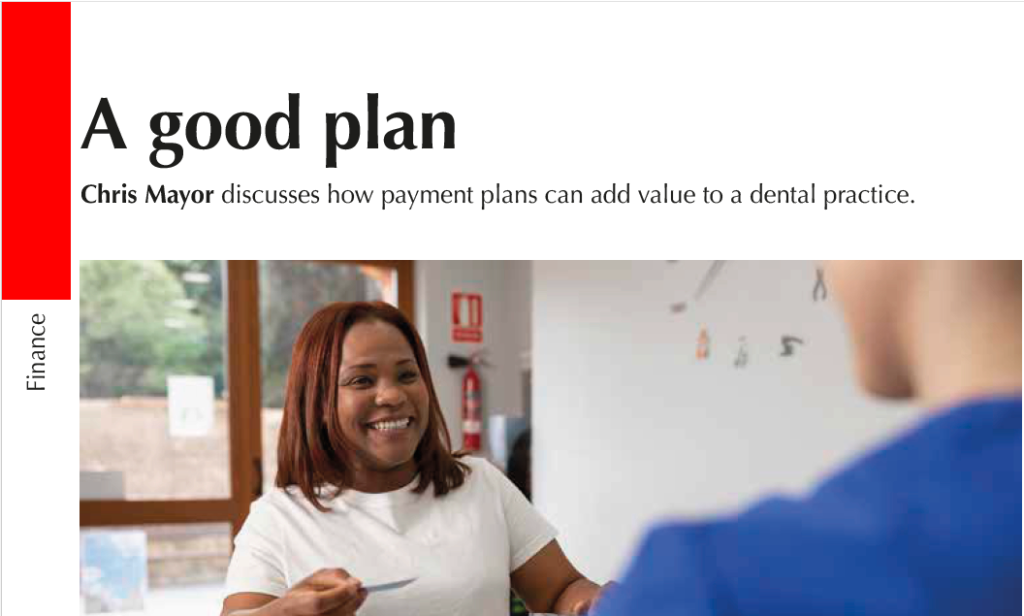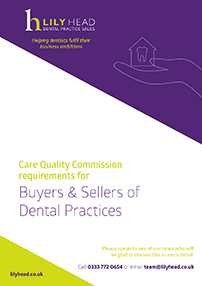Plans, such as Denplan, are designed to spread the cost of treatments. This makes looking after dental health easy and affordable. Plans with a good number of patients have been invaluable to many dentists in recent years. That stable and secure income source really helped practices manage cash flow during the forced shutdown during the pandemic. The benefit to those plan patients was in getting access to dentists when demand for check-ups and treatment outstripped capacity. In some areas this situation prevails even today.
When reviewing the influence of plan patients on a dental practice where the Principal is considering selling, we look at these 6 key areas.
- Financial Security – Practices with significant plan elements (30-40% + of turnover) are attractive. This ticks the ‘Private’ box which is currently popular with buyers. Buyers also see plan patients as secured income (goodwill) that they can build on in the future. Our colleagues at Lily Head Finance advise that lenders are now reviewing the total revenue of practices over the preceding 3 years when considering lending proposals. They are now less concerned about the details of what the breakdown of that revenue is. So, a practice with a good amount of plan income effectively has a larger chunk of their annual revenue locked in which makes funding for banks more attractive.
- The Revenue Mix – We carefully consider the revenue mix (NHS, Private & Plan) when valuing a dental practice. The multiples of EBITDA that we market practices for is influenced by the revenue mix. For many years, Plan patient bases have been considered beneficial in securing degrees of the overall goodwill value. We are also seeing demand for private dentistry growing in significance from independent and corporate buyers. Plans provide secured income and a solid base of general dentistry, from which advanced and cosmetic treatments can be born. For those sellers who can plan their exit/sale early, it may be worth focusing on growing your plan base now.
- More control of your business – Both NHS and Plan dentistry offer secured goodwill. However, NHS Dentistry is facing some real headwinds from NHS contracts, UDA values, DDRB (Doctors & Dentists Review Body) uplifts and challenges recruiting dentists which Principals have limited control over. Whereas with a plan, the plan type you offer, the monthly charges you apply, fee increases and to some extent the treatments you offer is up to the individual Principal.
- Goodwill Retention– From talking to dentists and reviewing the numbers we can say that, patients who are on a Plan are very loyal to their Practice. They are also more committed to preventative dental health care, and more likely to be regular attending. This is not to say that NHS and Private fee per item patients are not, but, in general, Plans are designed to provide patients and dentists with a vehicle to deliver regular, tailored dental care with budgeted costs and prearranged appointments.
- Capitation Plans – Many dentists and patients favour Capitation Plans. This is the more comprehensive service and when they are managed well they really work. A key recommendation for sellers is to ensure your house is kept in order with regular patient banding assessments, annually reviewing your plan fees, and ensuring the plan offerings you have match the type of dentistry and care you wish to offer patients. For buyers, we recommend spending time with the seller to review a sample of record cards, treatment plans, and to glean detail of banding assessments and fee increase history – This should be available through the Plan Provider. It’s also worth pointing out to buyers that there are signs of quality, such as Denplan Excel, which could give reassurance from a clinical care and governance perspective.
- Profit – When modelling practice valuations, one of the key areas we see that has significant impact on a practice’s profitability is hygiene services. It can be tricky to determine what proportion of plan revenue relates to hygiene services, especially for Capitation based schemes. What is key is that, as a practice owner, you’re not losing profit. This is even more important as a new successor owner comes in and they have to service a significant business loan to support the purchase. There’s also the challenge keeping Associates motivated to refer patients to hygienists and to promote the plan when it makes clinical sense. There are ways to ensure your practice is fair, equitable and profitable but this will again benefit from a timely review/revision in advance of any sale. It’s worth noting that we, as dental brokers, need to model and sell a practice as-is. It’s therefore better to resolve any profitability issues before the sale journey begins, rather than to pass the issue to a new owner, who’ll be focused on keeping things stable.
These are further considerations we share with buyers and sellers about Payment Plans.
Under treatment – This phenomenon describes where a dentist is receiving monthly payments from patients, but not providing the care/treatment that is deemed ‘clinically necessary’. Statistically this is more likely to involve dentists who are reaching retirement age. This is an area that prospective buyers will pay a good deal of attention to during the due diligence. If ‘Under Treatment’ has been occurring widely and over an extended period of time, this will likely create a nightmare situation (financially and logistically) for any new buyer.
The same is true for when a buyer takes over a list of capitation patients. Buyers will look to ensure there is not a significant number of patients needing extensive treatment in return for minimal capitation payments.
That said, a dentist cannot be held responsible for patients who have opted against having recommended treatments, attending examinations or hygiene appointments. It is certainly best practice to have detailed records of what was offered to patients and what their response was. We do see Maintenance Plans being more favoured by buyers because they present less risk yet provide all the benefits of regular income, attendance, and budgeting. Maintenance Plans are now more commonplace in Plan Practices.
We recommend Principals get with their local plan representative who will be able to provide a detailed plan on fees/increases, hourly rates, plan setup, re-banding. It is a myth that you should not tell your plan provider that you are considering a sale. They are there to help you.
Getting to know your Plan Provider – Where a patient plan exists, we recommend prospective buyers get to know their Plan Provider and more importantly their local representative at an early stage. Buyers should agree this with the Principal and bear in mind that this information will be confidential. This will enable the buyer to understand how the Plan Provider can support them going forwards.
If you would like to understand how your Patient Plan is contributing to the value of your dental practice please just get in touch.
This article was written by Chris Mayor, Commercial Director of Lily Head Dental Practice Sales . It was first published in the August 2023 edition of The Dentist Magazine.
If you would like to talk about anything to do with buying, selling or financing a dental practice anywhere in the UK then Contact Us today.






